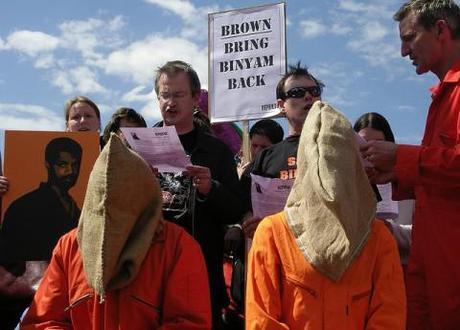
Protestors. Photocredit: art makes me smile http://www.flickr.com/photos/artmakesmesmile/2582112994/
The Gibson inquiry, named after its chairman, former Appeal Court Judge Sir Peter Gibson, was set up with much trumpeting in order to look into allegations of British complicity in the torture of detainees held by other countries after the September 11 terrorist attacks. The inquiry follows Binyam Mohamed’s claim that he was tortured in Pakistan whilst being held by the CIA – crucially, with the knowledge of the British security services. The inquiry was meant to be a swift, business-like affair: but now human rights agencies and lawyers, including Amnesty International and Reprieve, are intending to pull out, since the government has declared that the findings are likely to be kept secret. The human rights groups also claim that the inquiry does not comply with Article 3 of the European Convention of Human Rights (which prohibits torture). The inquiry, however, will go ahead, whilst commentators across the political spectrum agree that the whole thing is a sham.
- James Meikle on The Guardian reported that key sessions will take place in secret, whilst those who claim that they were tortured won’t be able to question MI5 or MI6 officers. Foreign intelligence agencies are also off the hook. Human rights agencies are claiming that this is a serious demonstration of the state’s inability to comprehend its crimes. Malcolm Rifkind, the former foreign secretary who chairs the intelligence and security committee, however, said that campaigners were “being unrealistic.” In a statement to the Today programme, he stated that there had to be “some element of trust” when the authorities were dealing with top secret information.
Shami Chakrabarti, director of Liberty, said: “If this inquiry proceeds without the participation of the victims it will be nothing more than a waste of time and public money. Until a credible, independent process is established this shameful chapter of the war on terror continues.”
- Tom Whitehead on The Daily Telegraph reported that critics have claimed that the inquiry would be an “unnecessary drain” on the security services and “could cost taxpayers as much as £10 million.”
- After Saddam Hussein invaded Kuwait, said Peter Oborne in The Daily Telegraph, British intelligence made it clear to Margaret Thatcher that they wanted to use information that they knew had been acquired through torture. The Prime Minister said that the British state should not, “in any circumstances”, use such intelligence. After the invasion of Iraq, it seems Tony Blair had fewer ethical qualms than his predecessor. Under Blair, the British secret state “lost its way.” We know this from the Butler inquiry. There’s no evidence, though, that British intelligence was involved in torture. They just left the room, and returned “after the last screams had died away.” The most notorious case is Binyam Mohamed’s, who was allegedly visited by an MI5 officer after being tortured in a Pakistan jail. This “treatment shames Britain, which ought to be a stronghold of fairness and decency.” The goverment has long covered up its complicity in torture, suppressing documents and making misleading statements. David Cameron’s made a good start with the Gibson inquiry, but there have been doubts about it. Sir Peter Gibson was the Intelligence Services Commissioner for four years – but he never asked questions about its behaviour during his tenure. We should be alarmed: the inquiry has no powers to call witnesses, whilst those claiming to be victims of torture won’t be able to question intelligence officers or challenge evidence. Thatcher made the right decision: we need to fight for her values, and for our international reputation. The Gibson inquiry must close, and a new, independent inquiry with proper powers must be appointed to investigate and, if necessary, expose what “appears to have been one of the most shameful episodes in the recent history of the British state.”
- Clare Algar, the Executive Director of Reprieve, made the organisation’s position clear on The Guardian. The inquiry has three shortcomings: “toothlessness, secrecy and a lack of independence.” It’s understaffed; and whilst sensitive matters mean that an entirely public process is unlikely, no attempt at balance has been made. Reprieve has “attempted to engage constructively with this inquiry”, but without success. It will be a whitewash. The government must listen, and give this inquiry the clout that it deserves.
- It’s a total farce, said The Morning Star. The British government always insists on openness in other parts of the world, but when it comes to us, a “veil of secrecy” descends. The detainees should be central to the inquiry: “Britain’s legal, political, military and security elite has no shame.” Failure to have an open inquiry will be seen as proof that allegations of complicity in torture are “well-founded”. Cameron must stop prevaricating, and “accept that the only honourable resolution of this catalogue of injustice lies in a credible, independent and transparent public inquiry.”



COMMENTS ( 1 )
posted on 12 January at 16:34
Malcolm Rifkind has seen torture in his constituency of RBKC- Kensington - naturally it is a safe seat, he would never have been voted in anywhere - he was ejected from Scotland by his own - this male is a dictator nothing more